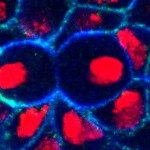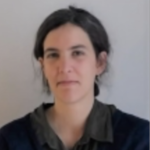Link to Pubmed [PMID] – 32328633
Link to DOI – 10.1083/jcb.201908006
J Cell Biol 2020 Apr; 219(4):
Ploidy variations such as genome doubling are frequent in human tumors and have been associated with genetic instability favoring tumor progression. How polyploid cells deal with increased centrosome numbers and DNA content remains unknown. Using Drosophila neuroblasts and human cancer cells to study mitotic spindle assembly in polyploid cells, we found that most polyploid cells divide in a multipolar manner. We show that even if an initial centrosome clustering step can occur at mitotic entry, the establishment of kinetochore-microtubule attachments leads to spatial chromosome configurations, whereby the final coalescence of supernumerary poles into a bipolar array is inhibited. Using in silico approaches and various spindle and DNA perturbations, we show that chromosomes act as a physical barrier blocking spindle pole coalescence and bipolarity. Importantly, microtubule stabilization suppressed multipolarity by improving both centrosome clustering and pole coalescence. This work identifies inhibitors of bipolar division in polyploid cells and provides a rationale to understand chromosome instability typical of polyploid cancer cells.

